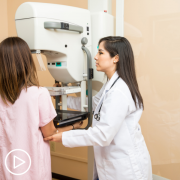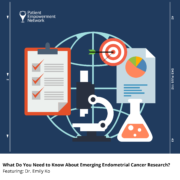What Do You Need to Know About Metastatic Breast Cancer Genetic Testing?
What Do You Need to Know About Metastatic Breast Cancer Genetic Testing? from Patient Empowerment Network on Vimeo.
Why is it important to ask about metastatic breast cancer genetic testing? Find out how test results could reveal more about YOUR breast cancer and could help determine the most effective treatment approach.
See More From INSIST! Metastatic Breast Cancer
Related Resources:
Transcript:
Why should you ask your doctor about metastatic breast cancer genetic testing?
The National Comprehensive Cancer Network – also known as the NCCN – recommends that every metastatic breast cancer patient undergo genetic testing. The test results can help predict how your cancer may behave and could indicate that one type of treatment is more effective than another.
This testing identifies specific gene mutations, proteins, chromosomal abnormalities, and/or other molecular changes that are unique to YOU and YOUR breast cancer.
There are two main types of genetic tests used in breast cancer:
- Germline or hereditary genetic testing, which identifies inherited gene mutations in the body. These mutations are present from birth, can be shared among family members and be passed on to subsequent generations.
- The second is somatic or tumor genetic testing, which identifies markers that are unique to the cancer itself. It is also commonly referred to as genomic testing, biomarker testing, or molecular profiling. Somatic mutations are NOT inherited or passed down from family member to family member.
- Depending on your history, your doctor may order one–or both–of these types of tests.
So why do the test results matter?
- If you have specific gene mutations – such as the BRCA1 or BRCA2 inherited gene mutations – it could indicate that a targeted treatment approach may be the most effective option. For example, there are two oral targeted therapies that are approved specifically for use in metastatic patients with BRCA1-positive or BRCA2-positive breast cancer.
- Results of these tests may also help you to find a clinical trial that may be appropriate for your particular cancer.
- Additionally, results from germline genetic testing may suggest that close family members should also be tested to determine their risk.
How can you insist on the best breast cancer care?
- First, always speak up and ask questions. Remember, you have a voice in YOUR breast cancer care.
- Ask your doctor if you have had–or will receive–genetic testing, including germline and somatic testing.
- If you have already undergone genetic testing, bring a copy of your results to your current doctor, so they can understand your results and determine whether additional testing is needed.
- Have a discussion with your healthcare team about the test results – including which markers were detected and how results may impact your care and treatment plan.
- Ask whether your family members should meet with a genetic counselor or undergo testing to help gauge their risk of developing breast cancer.
- And, finally, bring a friend or a loved one to your appointments to help you process and recall information.
To learn more about breast cancer and to access tools for self-advocacy, visit powerfulpatients.org/breastcancer.













